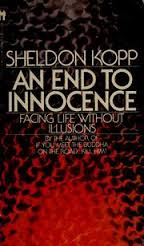When I do what I am doing, I am in the position to appreciate the fullness of the moment and to learn what the moment has to teach me. When my attention is split, I miss it.
But there is another far more damaging way that I split my attention. This goes beyond merely being distracted. This split involves a form of denial, and it happens whenever I have the thought, “This shouldn’t be happening to me.”
 “Life can be counted on to provide all the pain that any of us might possibly need.” This, believe it or not, is the beginning of one of my favorite quotes. The quote takes on added meaning when the author, Sheldon Kopp, continues, “At times, each of us adds a measure of needless suffering to that already weighty inevitable burden. We insist that life’s random mishaps and calamities should not be happening to us.”
“Life can be counted on to provide all the pain that any of us might possibly need.” This, believe it or not, is the beginning of one of my favorite quotes. The quote takes on added meaning when the author, Sheldon Kopp, continues, “At times, each of us adds a measure of needless suffering to that already weighty inevitable burden. We insist that life’s random mishaps and calamities should not be happening to us.”
Kopp goes on to differentiate legitimate suffering from needless suffering.
Legitimate suffering happens to everyone.
Legitimate suffering is the basis of Buddhism’s first nobel truth, “Life means suffering.”
The beginning phrase of Scott Peck’s, The Road Less Traveled, is “Life is difficult.”
Legitimate suffering is a given. Needless suffering is chosen.
It often does not feel like a choice, but it is. I invite needless suffering whenever I assume that this should not be happening to me. I do this in all kinds of ways:
“Why is this happening to me?”
“If only this weren’t happening.”
“If only I had…this would not be happening.”
“If only he/she had…this would not be happening.”
 You get the idea. Anything that keeps me from fully acknowledging the very real and legitimate suffering creates another level of distress, and this fabricated level of distress keeps me from doing what I need to do to deal with the real source of suffering.
You get the idea. Anything that keeps me from fully acknowledging the very real and legitimate suffering creates another level of distress, and this fabricated level of distress keeps me from doing what I need to do to deal with the real source of suffering.
In my own experiences of loss as well as those of the clients I have worked with, all of the rationalizations and denials of loss stand in the way of the grieving process. Even the ones that sound comforting on the surface (“She’s in a better place.” “At least he didn’t suffer.” “He would want you to be strong.” etc.) may provide a momentary relief, but they do not help me lean into the hard work of grieving.
Lent is about paying attention to our lives in a different, more intentional way. Among those things we must pay attention to are our losses, our disappointments, the many ways life has not unfolded for us the way we hoped. I must learn to address my legitimate suffering. Otherwise, I add needless suffering and miss the moments of healing, surprise, wonder, and gratitude.
0 Comments until now
Add your Comment!